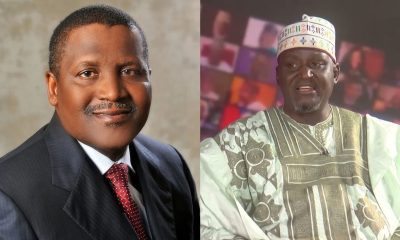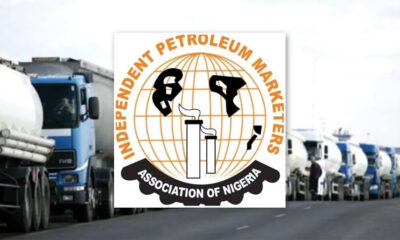News
Amid fuel scarcity, petrol marketers threaten to withdraw services over ₦200bn debt

Amid fuel scarcity, petrol marketers threaten to withdraw services over ₦200bn debt
The Independent Petroleum Marketers Association of Nigeria (IPMAN), has asked the Federal Government to pay ₦200bn the association is owed or the nation will face devastating socio-economic consequences.
The association threatened to withdraw its services, hence impeding the supply of Premium Motor Spirit (PMS), also known as petrol, over non-payment of the ₦200bn bridging claims.
IPMAN’s threat comes amid the worsening nationwide petrol scarcity which has seen prices of Premium Motor Spirit (PMS), also known as petrol, surge to between N610 and N800 at the pump, and between N1000 and N1200 at black market.
The association’s position was contained in communique released by the association’s Unit Chairman and Spokesperson, Aba Depot, Mazi Oliver Okolo after a press conference on Tuesday.
Okolo who handed down the threat said the IPMAN’s national leadership is wholly in support of the tough stance.
He claimed that the debt is being owed by the Nigerian Midstream and Downstream Petroleum Regulatory Commission (NMDPRA).
In the communique, Okolo said NMDPRA refused to pay the ₦200bn debt despite a directive for payment from the Petroleum Minister (Oil) Heineken Lokpobiri.
The IPMAN deport Chairman disclosed that since the directive by the minister in February 2024, only ₦13bn had been paid to their members, saying that the unpaid claim had crippled their businesses.
READ ALSO:
- Navy rescues 250 passengers onboard capsized Rivers boat
- Suspend new electricity tariff, Reps tell NERC
- Senate in rowdy session over sitting arrangements
“We are extremely distressed and depressed by the laidback attitude of the leadership of the Nigerian Midstream Downstream Petroleum Regulatory Authority (NMDPRA), towards the survival of our member’s businesses, arising from NMDPRA’s deliberate delay and refusal to offset the debt of over N200 Billion owed our members, which has consequently led to the deaths of many of our members and the unfortunate collapse of their businesses.”
He blamed the Nigerian National Petroleum Company Limited (NNPCL), the sole importer of petroleum products, for the current nationwide petrol scarcity, adding that some of its members have “completely” shut down their businesses, and retrenched their employees.
“We have watched with apprehension also, the unpatriotic attitude of the leadership of the NMDPRA to offset this debt that has been accrued to us since September 2022. As businessmen and women, our members acquired bank loans to keep their fuel retail outlets running daily across the nooks and crannies of Nigeria, to serve the teeming population of Nigerians. However, it is demoralising to know that many of our members have gone bankrupt and have become financially insolvent as a result of their inability to meet their financial obligations to their banks, arising wholly from their inability to get their monies from the NMDPRA. Consequently, also, the banks have taken over the business premises of many of our members. As indigenous organisations, and Depot Chairmen, we are unhappy that rather than receive support from the government to boost our businesses, we are being discouraged, by the head
of NMDPRA.
READ ALSO:
- Fuel Scarcity: Lagos warns stations against causing traffic gridlock
- Lagos Court orders Air Peace to answer FIJ’s queries on aircraft operations
- Woman arrested in Ogun after husband commits suicide
“It is noteworthy to recall and state here that at a stakeholders meeting held on the 20th of February, 2024 with Mr. Heineken Lokpobiri, the Honourable Minister of Petroleum Resources (Oil), and the NSA Nuhu Ribadu, Engr. Farouk Ahmed, the Chief Authority of NMDPRA, was mandated by Mr. Heinehken Lokpobiri to clear the entire debt in 40 days. However today, we have crossed the 40 days time-lapse given to the NMDPRA to clear the debt, and it is shameful to state that only the paltry sum of N13Billion has been paid, thus going the
whole length to ignore our plight without remorse and without recourse to the Honourable Minister’s directive,” according to the statement.
Okolo also claimed that the NNPC Ltd imports the products, and supplies to private depots who then sell to them at exorbitant prices of between ₦820 and ₦950 per litre, adding that IPMAN members pay an extra ₦2m to transport it to other parts of the country, making it difficult for them to sell to Nigerians at the agreed pump price.
The IPMAN members called on President Bola Tinubu, to closely look into the matter, which according to them, is highly detrimental to their businesses and reverse it forthwith, as it is bound to impact negatively on the masses thereafter.
“We see no reason why there should be an increment of over 500% on the Sales and Storage License by the NMDPRA. We totally reject it. We also hereby call on the federal government of Nigeria to wholly intervene forthwith in these lingering issues between the Independent Petroleum Marketers Association of Nigeria (IPMAN) and the Nigerian Midstream & Downstream Petroleum Regulatory Authority (NMDPRA).
“We are poised to take far-reaching decisions that may cripple the supply and sales of petroleum products across Nigeria, if our demands are not met within the shortest period,” the group said.
Amid fuel scarcity, petrol marketers threaten to withdraw services over ₦200bn debt
News
World Bank approves Tinubu’s $632m loan request

World Bank approves Tinubu’s $632m loan request
The World Bank is poised to approve $632 million in new loans to Nigeria today (Monday), amid growing concerns over the country’s expanding debt profile.
The loans are intended to support important sectors such as nutrition enhancement and quality basic education.
According to data obtained from the World Bank’s website on Sunday, the two loans scheduled to be approved today are $80 million for the Accelerating Nutrition Results in Nigeria 2.0 initiative and $552 million for the HOPE for Quality Basic Education for All programme.
Both projects are now in the negotiating phase and are likely to gain final clearance later today.
These new loans are part of the World Bank’s overall strategy to support Nigeria’s development agenda, which focuses on healthcare, education, and community resilience.
The loans will support the government’s efforts to improve nutrition and education for Nigerian children.
Additionally, the World Bank approved a $500 million loan for Nigeria’s Community Action for Resilience and Economic Stimulus Programme on March 28, 2025, a significant step towards addressing the country’s economic challenges through expanded access.
The initiative, formally known as the NIGERIA: Community Action (for) Resilience and Economic Stimulus Programme, is intended to give critical support to households impacted by economic downturns while also strengthening community resilience.
The initiative focuses on vulnerable populations, providing assistance to households and small companies to help them cope with economic difficulties.
READ ALSO:
- Okada rider allegedly stabbed to death by wife over money
- Police rescue two persons abducted in Lagos
- Miyetti Allah accuses Benue community of poisoning 20 cows
The loan clearance is likely to considerably boost Nigeria’s efforts to revive the economy through grassroots backing, especially given current issues such as inflation and high living costs.
The stimulus plan will prioritise enhancing food security and developing economic possibilities for the populations most affected by recent economic changes.
This decision came after a delay in distributing funds for a previous loan aimed at poor and vulnerable Nigerians.
Further investigation by The PUNCH revealed that the World Bank disbursed around $315 million to Nigeria from the $800 million allocated for the National Social Safety-net Program Scale Up.
Nigeria is yet to receive further funding from the World Bank for this loan project, which was approved in December 2021. The delay in grant release is most likely due to fraud detected under the initiative.
In honour of the 2023 International Day for the Eradication of Poverty, President Bola Tinubu unveiled a social safety net programme that will distribute N25,000 to 15 million households over the course of three months.
The Federal Ministry of Humanitarian Affairs and Poverty Alleviation was responsible for managing the $800 million World Bank loan initiative.
However, due to allegations of embezzlement, the federal government was forced to stop the cash transfer program for further investigation and reform.
Betta Edu, a former humanitarian minister, was previously suspended for misappropriating N585 million set aside for palliative care distribution.
READ ALSO:
- Wike’s aide slams Atiku, says it’s too late to buy integrity
- Reps Committee recovers N21.4bn from four oil companies
- West African juntas impose levy on imported goods ECOWAS nations
Furthermore, Sadiya Umar-Farouq, Edu’s predecessor, was under investigation by the EFCC. The former minister is being investigated for allegedly laundering N37.1 billion during her stint as minister.
The World Bank also imposed sanctions on people and businesses discovered to be engaging in fraud under the initiatives.
According to the World Bank’s official website, this will bring Nigeria’s total approved loans to $9.25 billion over three years, indicating a growing reliance on multilateral funding to support critical sectors of the economy such as infrastructure, healthcare, education, and financial resilience.
A review of Nigeria’s World Bank loan approvals since 2023, under President Bola Tinubu’s government, reveals a huge rise in funding commitments.
In 2023, the World Bank approved $2.7 billion in loans for renewable energy, women’s empowerment, education, and the power sector. In 2024, funding approvals totalled $4.32 billion for various projects.
This increase was largely due to Nigeria’s growing need for financial assistance to stabilise the economy amid fiscal pressures and rising public debt.
Under President Bola Tinubu’s administration, the World Bank granted around 11 different credit projects for Nigeria.
In less than two years, the federal government has acquired loans from the World Bank totalling $7.45 billion, raising concerns about the mounting debt burden. According to data from the Debt Management Office, the World Bank’s portion of Nigeria’s external debt is $17.32 billion as of the third quarter of 2024.
The International Development Association is owing the majority of this debt, which amounts to $16.84 billion, or 39.14 per cent of Nigeria’s total external debt.
The International Bank for Reconstruction and Development, another World Bank subsidiary, is owing $485.08 million, or 1.13 per cent.
While the planned World Bank loans may give much-needed budgetary relief, concerns persist about the country’s mounting debt burden.
According to recent data from the Central Bank of Nigeria, the country has spent $5.47 billion servicing external debt in the last 14 months, underscoring the strain on its foreign reserves.
World Bank approves Tinubu’s $632m loan request
News
Investigation of wanted businesswoman Achimugu not linked with Atiku, Sanwo-Olu – EFCC
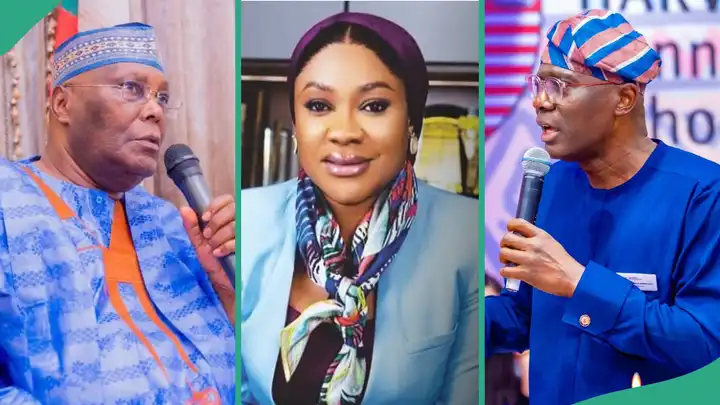
Investigation of wanted businesswoman Achimugu not linked with Atiku, Sanwo-Olu – EFCC
The Economic and Financial Crimes Commission has reacted to media reports linking its investigations of Ms. Aisha Achimugu with political undercurrents involving former Vice President Atiku Abubakar and Lagos State Governor, Babajide Sanwo-Olu
This is contained in a statement by the commission on Friday night.
The statement read, “We wish to state unequivocally that the investigations of Achimugu have no correlation of any kind with the two political actors. She is being investigated for alleged criminal conspiracy and money laundering and has since been declared Wanted by the Commission”.
The EFCC started investigating Achimugu in 2022. Although she approached the court to obtain an injunction restraining the Commission from arresting, investigating, inviting or detaining her for any alleged criminal act, the injunction was challenged and vacated on Wednesday, February 19, 2025 by a Federal High Court sitting in Abuja.
The court ruled that “…no court has the power to stop the investigative powers of the Police or EFCC or any agency established under our laws to investigate crimes when there is reasonable suspicion of commission of a crime or ample evidence of commission of an offence by a suspect.”
“The court further upheld the interim order of forfeiture of assets of Achimugu suspected to be proceeds of crime, dismissing her suit against it as lacking merit .
“The foregoing clearly establishes that the EFCC’s case against her has no immediate or remote nexus with any politician or any veiled or open reference to any political engagement or transaction.
“The EFCC is non-partisan and non-sectarian. We enjoin the public to continue to keep faith with the professionalism of the Commission without imputing any extraneous consideration to its works.”
News
Why governors’ forum is silent on Rivers emergency, by DG
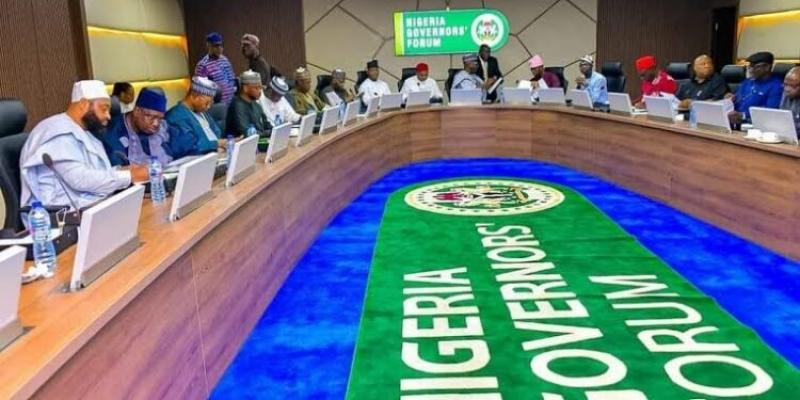
Why governors’ forum is silent on Rivers emergency, by DG
The Nigeria Governors’ Forum (NGF) yesterday attributed its neutral position on the recent declaration of a state of emergency in Rivers State to the need to steer clear of taking positions that may alienate members with varying political interests.
Taking positions on contentious partisan issues, the NGF said, would not augur well for it, especially in view of its past experience in fundamental division.
Notwithstanding, the declaration of the state of emergency by President Bola Tinubu yesterday generated more kudos and knocks from across the country.
Special Adviser to the President on Senate Matters, Senator Basheer Lado, said the action of the president was meant to ensure protection of lives and restoration of law and order in the state, while the President’s Special Adviser on Media and Public Communications, Sunday Dare, said his principal was required to “avert needless harm and destruction .”
National Publicity Secretary of the ruling All Progressives Congress (APC), Felix Morka, said Tinubu, by his action, cleared what had manifested as a constitutional crisis in Rivers state.
But former President Goodluck Jonathan saw it from a different perspective.
READ ALSO:
- Senate didn’t get 2\3 majority for Tinubu emergency rule in Rivers –Tambuwal
- FG destroys another 200 containers of expired drugs
- Rivers court bars woman from answering ex-husband’s name
He described “abuse of office and power by the three arms of government in the country“ as a dent on Nigeria’s image.
The NGF, in a statement by its Director General Abdulateef Shittu, said it is essentially “an umbrella body for sub-national governments to promote unified policy positions and collaborate with relevant stakeholders in pursuit of sustainable socio-economic growth and the well-being of the people.”
It added: “As a technical and policy hub comprising governors elected on different platforms, the body elects to steer clear of taking positions that may alienate members with varying political interests.
“In whatever language it is written, taking positions on contentious partisan issues would mean a poor sense of history — just a few years after the forum survived a fundamental division following political differences among its members.
“Regardless, the Forum is reputed for its bold positions on governance and general policy matters of profound consequences, such as wages, taxes, education and universal healthcare, among others.”
It asked for “the understanding of the public and the media, confident that appropriate platforms and crisis management mechanisms would take care of any such issues.”
Why governors’ forum is silent on Rivers emergency, by DG
-

 Uncategorized2 days ago
Uncategorized2 days agoBreaking: Moon sighted in Saudi, UAE, others, Eid-Fitr holds Sunday
-

 metro2 days ago
metro2 days agoRamadan ends in Nigeria, Sultan announces March 30 as Eid-el-Fitr
-
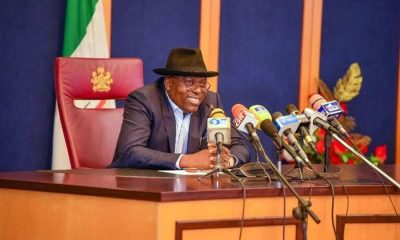
 metro2 days ago
metro2 days agoFubara reacts as Ex-HOS, Nwaeke accuses him of bombing oil pipelines, Rivers Assembly
-

 metro2 days ago
metro2 days agoEmbrace environmental sanitation during Eid-Fitr, LAGESC boss tells Lagosians
-

 Opinion2 days ago
Opinion2 days agoBarbaric mass burning of innocents in Edo, by Farooq Kperogi
-
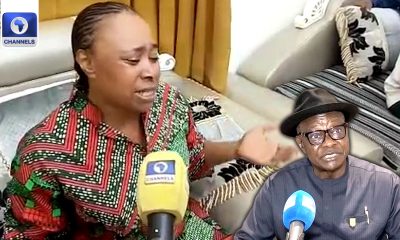
 metro2 days ago
metro2 days agoEx-Rivers HoS wife cries for help over husband’s safety
-
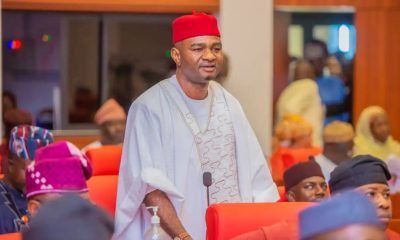
 metro2 days ago
metro2 days agoNatasha: Emmanuel Uduaghan threatens to sue Senator Nwaebonyi
-
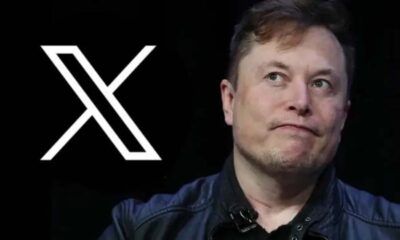
 Business2 days ago
Business2 days agoElon Musk sells X to AI startup for $33 billion







